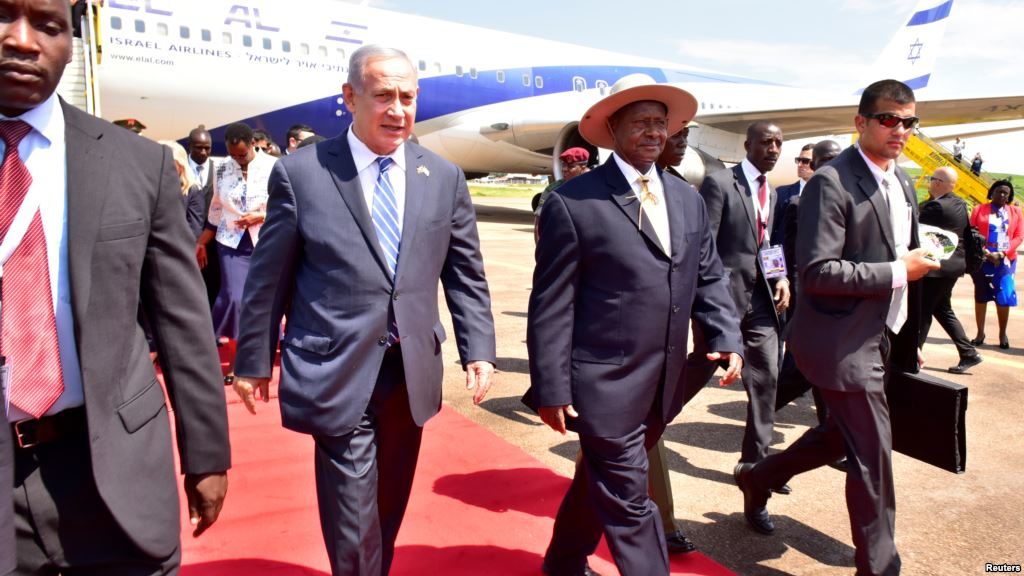FRESH AIR
UPDATES
Uganda is Full of Surprises
July 7, 2016 | Aaron Torop

The first stop of Israeli Prime Minister Netanyahu’s widely anticipated trip to Africa was Uganda, where he commemorated the fortieth anniversary of Operation Yonatan, named posthumously after his older brother – the only Israeli military casualty of the famous operation. In 1976, an Air France flight was hijacked by pro-Palestinian terrorists and landed in Uganda, at Entebbe Airport. The terrorists then separated the Israeli passengers from the rest and took them hostage, allowing the others to go free. Notably, a few of the non-Israeli passengers in addition to the flight crew stayed with the hostages, refusing to abandon them.
Israel executed an ingenious yet risky rescue mission to free the hostages. Using Kenya as a place to refuel, the IDF flew into Uganda with a black Mercedes, the signature car of Idi Amin, the dictator who ruled Uganda at the time. Posing as Amin, they went to the airport to free the hostages. However, Amin had recently started using a white Mercedes, and when a Ugandan soldier realised the discrepancy, a firefight ensured.
In under an hour, Israeli forces successfully killed all eight terrorists, freed the hostages (except for a few who were tragically killed in the crossfire and one who was hospitalised in Uganda and subsequently murdered) and suffered only one casualty: Yonatan Netanyahu.
When Netanyahu arrived in Uganda he was the first Prime Minister of Israel to visit since the raid. He spoke deeply and personally about the impact of the operation, saying, “Entebbe is always with me, in my thoughts, in my consciousness and deep in my heart.”
Making a moving statement about the importance of the operation, he continued:
“At Entebbe, justice overcame evil, and for this simple reason, the operation has earned the sympathy of the world and its praise. Operation Jonathan at Entebbe has become the symbol of standing strongly against terror. It set the rule that when the location of the hostages is known – action should be taken to rescue them. It improved Israel’s standing in the world and struck a deadly blow against terrorism. The battle against terrorism continues today. Terror threatens all countries and all continents, and we must stand against it united in spirit, a united front, in the spirit of Entebbe. This is the only way we will beat it….
This is why Entebbe was more than an Israeli victory; it was a victory for all humanity in the fight against those who threaten our common civilization.
The raid on Entebbe was a watershed moment in the life of my people. For centuries, Mr. President, we were stateless and powerless to defend ourselves. No one came to our rescue. We were murdered by the millions. The rise of Israel changed all that. Time and again, Israel has successfully defended itself against enemies committed to our destruction.
But it was perhaps at Entebbe where this fundamental transformation was most dramatically seen by the world. On July 4, 1976, Israel launched the most daring rescue mission of all time to save our captive brethren in the heart of Africa. We were powerless no more. We would do whatever it would take to defend our nation and rescue our people.”
However, following Netanyahu’s heartfelt address, Ugandan President Yoweri Museveni’s effort was less than stellar. To Netanyahu’s credit, this bizarre and gaffe-filled speech did not seem to affect the success of the trip in any way. The two continued onto a counter-terrorism summit with other African nations and Netanyahu continued his trip according to plan.
This unfortunate misstep is not a singular event in the history of Ugandan-Israeli relations. Idi Amin, the dictator at the time of the hijacking, visited Israel after taking power in 1971 and seemed willing to cooperate with Israel. However, just one year later, he expelled Israelis from the country after a meeting with Muammar Gaddafi. He subsequently welcomed the hijacking of the Air France plane in 1976. It was 18 years later, in 1994, when Israel and Uganda finally resumed diplomatic ties.
This most recent gaffe proves that the journey to continued and improved relations will not be easy, but the opportunities of economic and diplomatic cooperation outweigh the uncomfortable interactions that may persist.
After visiting Uganda, Netanyahu travelled to Kenya, Rwanda and Ethiopia to discuss economic, security, and diplomatic ties between Israel and these nations.
Aaron Torop
Tags: Africa
RELATED ARTICLES

Enormous hope that Iran is being liberated: Colin Rubenstein on Sky News

He survived Bondi. Now he’s fighting back: Arsen Ostrovsky addresses AIPAC conference





















